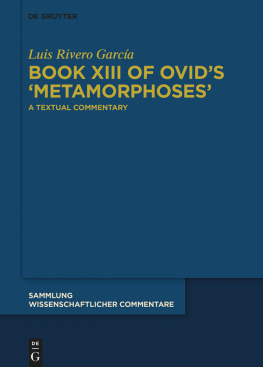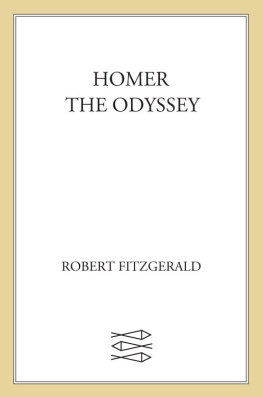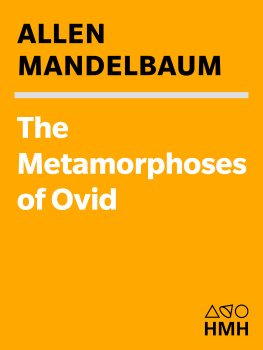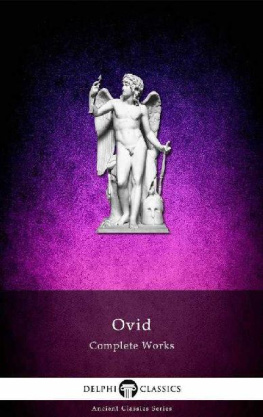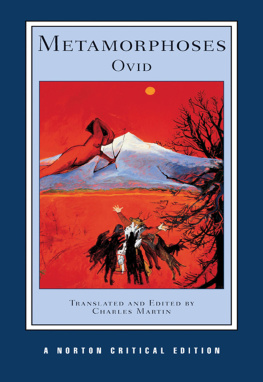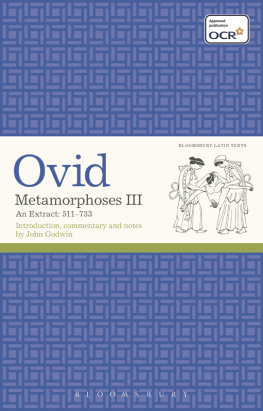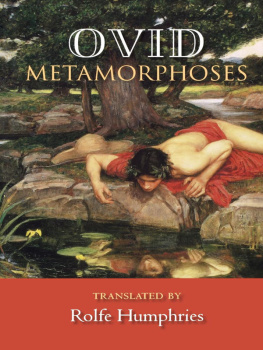Contents
Guide

Luis Rivero Garca
Book XIII of Ovids Metamorphoses
A Textual Commentary
Sammlung
wissenschaftlicher Commentare
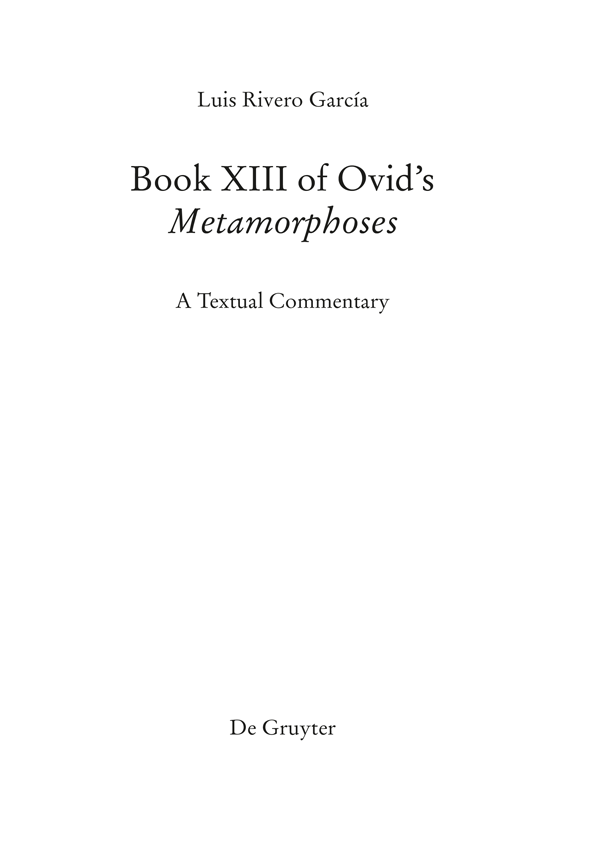
ISBN 978-3-11-061010-9
e-ISBN (PDF) 978-3-11-061249-3
e-ISBN (EPUB) 978-3-11-061153-3
ISSN 1864-3426
Library of Congress Cataloging-in-Publication Data
Names: Rivero Garca, Luis, author.
Title: Book XIII of Ovid's Metamorphoses : a textual commentary / Luis Rivero Garca.
Description: Berlin : De Gruyter, 2018. | Series: Sammlung wissenschaftlicher Commentare
Identifiers: LCCN 2018023828 (print) | LCCN 2018026378 (ebook) | ISBN 9783110612493 (electronic Portable Document Format (pdf) | ISBN 9783110610109 (print : alk. paper) | ISBN 9783110612493 (e-book pdf) | ISBN 9783110611533 (e-book epub)
Subjects: LCSH: Ovid, 43 B.C.-17 A.D. or 18 A.D. Metamorphoses. Liber 13--Commentaries.
Classification: LCC PA6519.M9 (ebook) | LCC PA6519.M9 R54 2018 (print) | DDC 873/.01--dc23
LC record available at https://lccn.loc.gov/2018023828
Bibliographic information published by the Deutsche Nationalbibliothek
The Deutsche Nationalbibliothek lists this publication in the Deutsche
Nationalbibliografie; detailed bibliographic data are available in the Internet
at http://dnb.dnb.de.
2018 Walter de Gruyter GmbH, Berlin/Boston
www.degruyter.com
Acknowledgements
The present volume was conceived over a decade ago and has taken shape in different places and with the collaboration of numerous individuals and institutions. To begin with the latter, the book owes a great deal to the support of the University of Huelva, which harbours the projects of the Nicolaus Heinsius Research Group, within which Prof. Antonio Ramrez de Verger made his proposal to compile all the information possible on the transmission of the text of Ovids Metamorphoses and make it available to the international community. With this book we bring that idea to partial fruition, to be accompanied by my colleagues studies on other books of Ovids poem.
For this ambitious task we have also enjoyed the institutional support of several Research Projects of Excellence: OVIDIANA : Comentario crti-co-textual y edicin del texto de las Metamorfosis (FFI2008-01843) and The Metamorphoses of Ovid: 35 Years of Research (19802014). With an Appendix on Manuscripts and Editions (s. IX-XXI) (FFI2013-42529), both financed by the Spanish government with the aid of FEDER funds during the years 20092018; Las Metamorfosis de Ovidio: edicin crtica, traduccin y comentario (HUM-1019) and Edicin crtica y comentario textual de las Metamorfosis y Opera Minora de Ovidio (HUM-4534), both financed by the regional government of Andaluca during the years 20062014. These projects have guaranteed the efficient teamwork required to locate and acquire documents (mainly manuscripts, editions and critical articles), and have enabled us to establish common working lines and methods for the production of the commentaries, as well as to train new researchers by means of four doctoral theses read in this period (on Books III, VII, X and XI).
But our work would have been less efficient had we not been able to count on the support of Huelva University Library and its staff, ever attentive to our needs and promptly overseeing the location and acquisition of the documents essential to our research tasks. I would like to express my sincere gratitude to all of them, and in particular to D Aurora Romero, who from the Interlibrary Loan Service attended to our constant and often problematic requests with patience, thoughtfulness and professional discipline.
However, my work has not only been carried out at home but, thanks again to the financial support of different institutions, I have been given access to the wealth of bibliographical resources of several European libraries, whose staff I would also like to thank for enabling me to make the most of my research stays: the Bibliothque Nationale de France in Paris; the Universiteitsbibliotheek of Leiden; the Bayerische Staatsbibliothek in Munich; the Biblioteca Universitaria di Bologna; the libraries of the Deutsches Archeologisches Institut, the cole Franaise and the Nazionale Centrale in Rome; the Biblioteca Palatina di Parma; the Biblioteca Medicea Laurenziana in Florence; the Biblioteca Nazionale di Napoli.
Special thanks, however, are due to Dra. Paola Errani, of the Biblioteca Malatestiana di Cesena, who along with the rest of her team greatly facilitated my research into the fragmentum Caesenas in February 2014. Also to Dr. Marco Buonocore, on whose learned help I have been able to count in each of my consultations and who made my work in the Biblioteca Apostolica Vaticana so much easier in the first half of 2015. And, finally, to Dra. Denise Gavio and all the staff of one of my favourite study places: the American Academy in Rome, in whose main building on the Gianicolo a considerable part of this commentary was produced, in both March-September 2008 and March-June 2015, thanks to scholarships from the Spanish government.
And, returning home, to the people to whom I am most greatly indebted: my colleagues in the Departamento de Filologa and the Centro de Investigacin en Patrimonio Histrico, Cultural y Natural (CIPHCN) of the University of Huelva, ever ready to assist when I have needed their help, and in particular to my colleagues in the Nicolaus Heinsius Research Group, without whom I now feel almost incapable of working. I would like to acknowledge the permanent availability, whether in person or at a distance, of doctors Ramrez de Verger, Estvez Sola, Bellido Daz, Dez Reboso, Surez del Ro, Fbregas Salis and Fernndez Valverde, and to this list I must add the name of the sadly departed Georg Luck. The constant exchange of information and suggestions with all of them has enriched each and every one of the pages of this book. In particular, I would like to thank Professor Bellido Daz for having read the first version of the book and for his perceptive corrections, and Professors Ramrez de Verger and Estvez Sola for their willingness to take over my teaching tasks so that I could enjoy one years research leave during the academic year 20142015.
I would also like to thank J.J. Zoltowski for his help with the English translation of the book. Finally, I would like to offer public recognition of my gratitude to the publisher Walter de Gruyter for bringing this volume to the hands of our readers.
I cannot but finish these acknowledgements without mentioning all those who with their understanding and patience and no less with their proud support have made it possible for me to devote endless hours to the scrutiny of manuscripts and the analysis of these verses of Ovid, in short, to our famous nugae philologicae : To Salud and Luis, mea uita ; to my mother, sister and brothers, who were always at hand; to my father, who did not live to see this book in print but is present in every word; to my friends, gaudium meum , freely chosen from those who have chanced to cross my path.
Huelva-Sevilla-Extremadura, March 2018.
Introduction
The essential objective of Philology is to establish a text for subsequent internal and external analysis. This critical-textual commentary on Book XIII of Ovids Metamorphoses is presented as a basic tool for this primary purpose. The aim is for the specialist reader to be able to find here all the textual information generated by each passage from the earliest manuscripts transmitting, in whole or in part, this book of Ovids opus magnum , without ignoring the data provided since Ovids own time by the evidence of the indirect tradition. Also included here is information on the way in which editors and critics have interpreted each passage from the 15 th century down to the present. Finally, this volume does not hold back from entering the fray in an attempt to make its own modest contribution to the fixing of the text at its more obscure points. Consequently, the commentary on each section is generally accompanied by a reasoned stance adopted by the author of these pages in relation to the textual obstacle under discussion.

